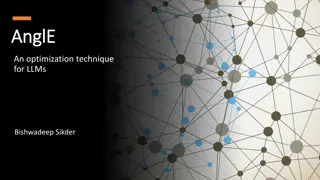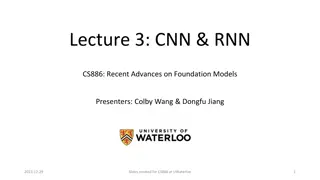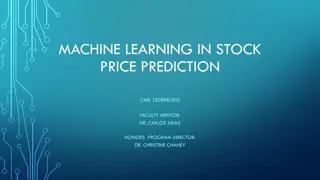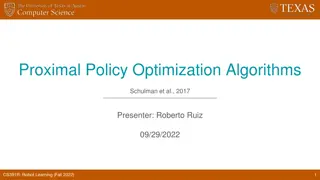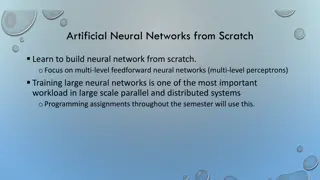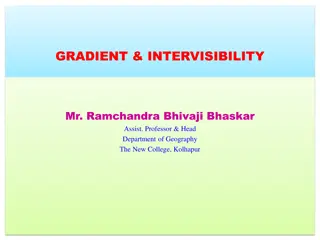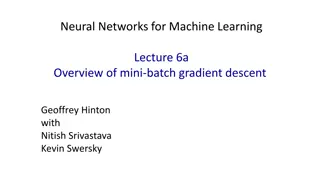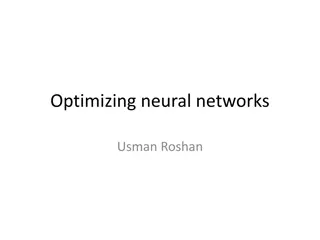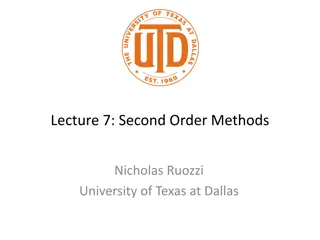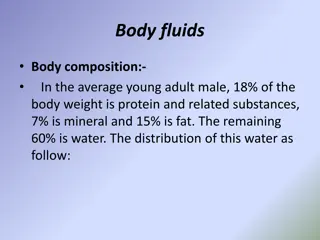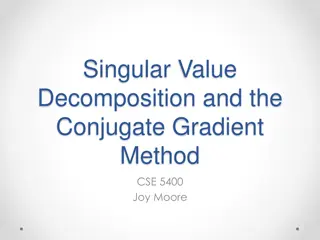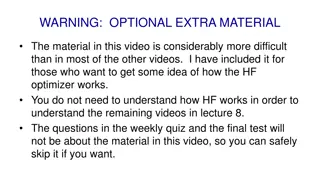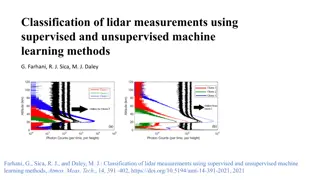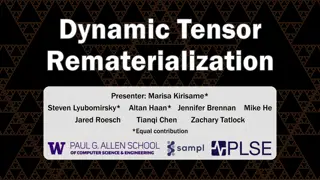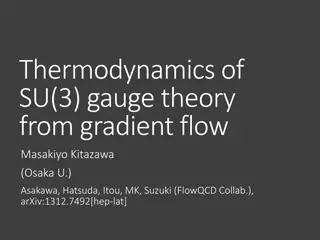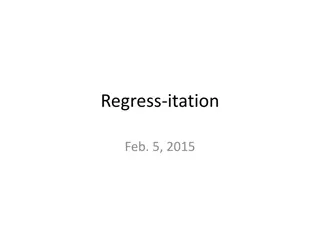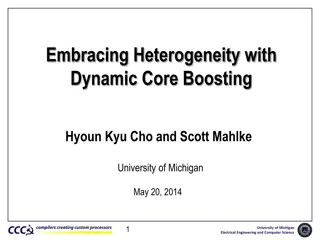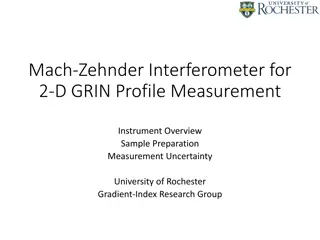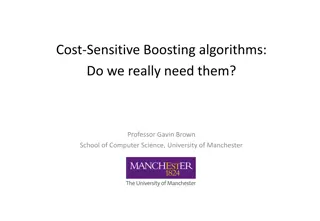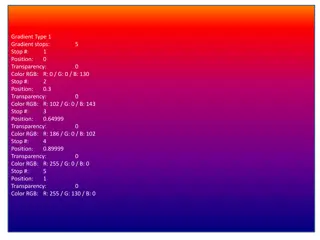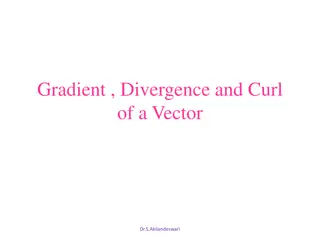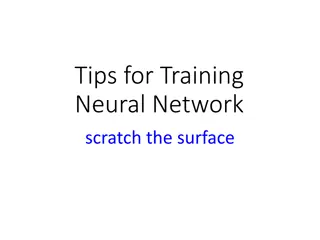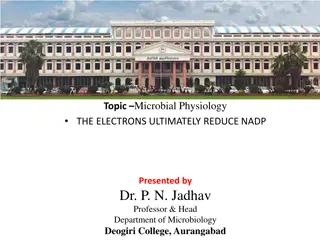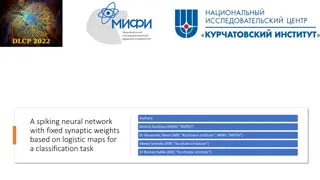AnglE: An Optimization Technique for LLMs by Bishwadeep Sikder
The AnglE model introduces angle optimization to address common challenges like vanishing gradients and underutilization of supervised negatives in Large Language Models (LLMs). By enhancing the gradient and optimization processes, this novel approach improves text embedding learning effectiveness.
9 views • 33 slides
Basic Principles of MRI Imaging
MRI, or Magnetic Resonance Imaging, is a high-tech diagnostic imaging tool that uses magnetic fields, specific radio frequencies, and computer systems to produce cross-sectional images of the body. The components of an MRI system include the main magnet, gradient coils, radiofrequency coils, and the
2 views • 49 slides
Understanding Alluvial Fans: Formation, Characteristics, and Morphology
Alluvial fans are cone-shaped landforms formed by streams carrying sediments from mountains onto plains. They are prominent in arid to semi-arid regions and vary in size from a few meters to over 150 kilometers. The different zones of an alluvial fan, including the fan apex and distal fan, display d
5 views • 9 slides
Do Input Gradients Highlight Discriminative Features?
Instance-specific explanations of model predictions through input gradients are explored in this study. The key contributions include a novel evaluation framework, DiffROAR, to assess the impact of input gradient magnitudes on predictions. The study challenges Assumption (A) and delves into feature
0 views • 32 slides
Recent Advances in RNN and CNN Models: CS886 Lecture Highlights
Explore the fundamentals of recurrent neural networks (RNNs) and convolutional neural networks (CNNs) in the context of downstream applications. Delve into LSTM, GRU, and RNN variants, alongside CNN architectures like ConvNext, ResNet, and more. Understand the mathematical formulations of RNNs and c
1 views • 76 slides
Boosting Your Reach with PR Newswire
Learn how to leverage PR Newswire's distribution network to get your message in front of the right audience and achieve greater media coverage. Download this PDF for insights on boosting your reach and brand awareness.
0 views • 12 slides
Understanding Machine Learning for Stock Price Prediction
Explore the world of machine learning in stock price prediction, covering algorithms, neural networks, LSTM techniques, decision trees, ensemble learning, gradient boosting, and insightful results. Discover how machine learning minimizes cost functions and supports various learning paradigms for cla
2 views • 8 slides
League Boosting | Lol-boosts.com
Use the expert league-boosting services offered by Lol-boosts.com to advance in your preferred game. Take the lead and move up the rankings right now!\n\n\/\/lol-boosts.com\/
5 views • 1 slides
Advanced Reinforcement Learning for Autonomous Robots
Cutting-edge research in the field of reinforcement learning for autonomous robots, focusing on Proximal Policy Optimization Algorithms, motivation for autonomous learning, scalability challenges, and policy gradient methods. The discussion delves into Markov Decision Processes, Actor-Critic Algorit
6 views • 26 slides
Understanding Artificial Neural Networks From Scratch
Learn how to build artificial neural networks from scratch, focusing on multi-level feedforward networks like multi-level perceptrons. Discover how neural networks function, including training large networks in parallel and distributed systems, and grasp concepts such as learning non-linear function
1 views • 33 slides
Forces Affecting Air Movement: Pressure Gradient Force and Coriolis Force
The pressure gradient force (PGF) causes air to move from high pressure to low pressure, with characteristics including direction from high to low, perpendicular to isobars, and strength proportional to isobar spacing. The Coriolis force influences wind direction due to the Earth's rotation, making
0 views • 20 slides
Benefits of Image Submission for Boosting Engagement
Discover the top 10 benefits of image submission, from enhancing visual appeal and boosting SEO to increasing social media engagement and driving higher conversion rates. Learn how using images can improve branding, simplify complex information, and
0 views • 4 slides
Understanding Slope, Gradient, and Intervisibility in Geography
Explore the concepts of slope, gradient, and intervisibility in geography through detailed descriptions and visual representations. Learn about positive, negative, zero, and undefined slopes, the calculation of gradient, and the significance of understanding these aspects in various engineering and
0 views • 12 slides
A Comprehensive Guide to Gradients
Gradients are versatile tools in design, allowing shapes to transition smoothly between colors. Learn about gradient types, preset options, creating your own metallic gradients, and applying gradients effectively in this detailed guide. Explore linear and radial gradient directions, understand gradi
0 views • 7 slides
Mini-Batch Gradient Descent in Neural Networks
In this lecture by Geoffrey Hinton, Nitish Srivastava, and Kevin Swersky, an overview of mini-batch gradient descent is provided. The discussion includes the error surfaces for linear neurons, convergence speed in quadratic bowls, challenges with learning rates, comparison with stochastic gradient d
0 views • 31 slides
Efficient Gradient Boosting with LightGBM
Gradient Boosting Decision Tree (GBDT) is a powerful machine learning algorithm known for its efficiency and accuracy. However, handling big data poses challenges due to time-consuming computations. LightGBM introduces optimizations like Gradient-based One-Side Sampling (GOSS) and Exclusive Feature
0 views • 13 slides
Understanding Optimization Techniques in Neural Networks
Optimization is essential in neural networks to find the minimum value of a function. Techniques like local search, gradient descent, and stochastic gradient descent are used to minimize non-linear objectives with multiple local minima. Challenges such as overfitting and getting stuck in local minim
0 views • 9 slides
Optimization Methods: Understanding Gradient Descent and Second Order Techniques
This content delves into the concepts of gradient descent and second-order methods in optimization. Gradient descent is a first-order method utilizing the first-order Taylor expansion, while second-order methods consider the first three terms of the multivariate Taylor series. Second-order methods l
0 views • 44 slides
Understanding Body Fluids and Composition in the Human Body
The body composition of an average young adult male includes protein, mineral, fat, and water in varying proportions. Water is the major component, with intracellular and extracellular distribution. Movement of substances between compartments occurs through processes like simple diffusion and solven
0 views • 37 slides
Understanding Singular Value Decomposition and the Conjugate Gradient Method
Singular Value Decomposition (SVD) is a powerful method that decomposes a matrix into orthogonal matrices and diagonal matrices. It helps in understanding the range, rank, nullity, and goal of matrix transformations. The method involves decomposing a matrix into basis vectors that span its range, id
0 views • 21 slides
Boosting Self-esteem and Confidence Session for Students
This session aims to help students identify and increase their belief in personal strengths, boosting self-esteem and confidence. Students are encouraged to practice noticing their strengths and creating a list to remind themselves daily. The session focuses on building skills and self-esteem throug
0 views • 6 slides
Understanding Hessian-Free Optimization in Neural Networks
A detailed exploration of Hessian-Free (HF) optimization method in neural networks, delving into concepts such as error reduction, gradient-to-curvature ratio, Newton's method, curvature matrices, and strategies for avoiding inverting large matrices. The content emphasizes the importance of directio
0 views • 31 slides
Understanding Gradient Boosting and XGBoost in Decision Trees
Dive into the world of Gradient Boosting and XGBoost techniques with a focus on Decision Trees, their applications, optimization, and training methods. Explore the significance of parameter tuning and training with samples to enhance your machine learning skills. Access resources to deepen your unde
1 views • 9 slides
Classification of Lidar Measurements Using Machine Learning Methods
This study focuses on classifying lidar measurements using supervised and unsupervised machine learning methods. By utilizing machine learning, specifically supervised learning, the researchers trained a prediction function to automatically label unlabeled lidar scans. They conducted steps to implem
0 views • 16 slides
Overcoming Memory Constraints in Deep Neural Network Design
Limited availability of high bandwidth on-device memory presents a challenge in exploring new architectures for deep neural networks. Memory constraints have been identified as a bottleneck in state-of-the-art models. Various strategies such as Tensor Rematerialization, Bottleneck Activations, and G
0 views • 32 slides
Exploration of Thermodynamics in SU(3) Gauge Theory Using Gradient Flow
Investigate the thermodynamics of SU(3) gauge theory through gradient flow, discussing energy-momentum stress pressure, Noether current, and the restoration of translational symmetry. The study delves into lattice regularization, equivalence in continuum theory, and measurements of bulk thermodynami
0 views • 40 slides
Understanding Linear Regression and Gradient Descent
Linear regression is about predicting continuous values, while logistic regression deals with discrete predictions. Gradient descent is a widely used optimization technique in machine learning. To predict commute times for new individuals based on data, we can use linear regression assuming a linear
0 views • 30 slides
Understanding Linear Regression and Classification Methods
Explore the concepts of line fitting, gradient descent, multivariable linear regression, linear classifiers, and logistic regression in the context of machine learning. Dive into the process of finding the best-fitting line, minimizing empirical loss, vanishing of partial derivatives, and utilizing
0 views • 17 slides
Dynamic Core Boosting for Heterogeneous Computing
Exploring the challenges of workload heterogeneity in parallel programming, focusing on the impact of asymmetric hardware on performance and synchronization. Insights on modeling workload imbalance and boosting critical paths for efficient computation in heterogeneous multicores.
0 views • 22 slides
Mach-Zehnder Interferometer for 2-D GRIN Profile Measurement
Mach-Zehnder Interferometer is a powerful tool used by the University of Rochester Gradient-Index Research Group for measuring 2-D Gradient-Index (GRIN) profiles. This instrument covers a wavelength range of 0.355 to 12 µm with high measurement accuracy. The sample preparation involves thin, parall
0 views • 6 slides
Analysis of Cost-Sensitive Boosting Algorithms
Explore the discussion around the necessity of cost-sensitive boosting algorithms as a unified approach in machine learning. Discover the boosting approach, Adaboost algorithm, theoretical history, and comparison with traditional learning algorithms. Dive into the process of turning weak learners in
0 views • 33 slides
Gradient Types and Color Patterns
The content describes various gradient types and color patterns using RGB values and positioning to create visually appealing transitions. Each gradient type showcases a unique set of color stops and positions. The provided information includes detailed descriptions and links to visual representatio
0 views • 24 slides
Understanding Gradient, Divergence, and Curl of a Vector with Dr. S. Akilandeswari
Explore the concepts of gradient, divergence, and curl of a vector explained by Dr. S. Akilandeswari through a series of informative images. Delve into the intricacies of vector analysis with clarity and depth.
0 views • 13 slides
E-commerce Development Strategies for Boosting Sales and Conversions.
\"E-commerce development strategies can transform your business by boosting sales, improving user experience, and enhancing conversions with cutting-edge techniques.\
1 views • 1 slides
E-commerce Development Strategies for Boosting Sales and Conversions.
\"E-commerce development strategies can transform your business by boosting sales, improving user experience, and enhancing conversions with cutting-edge techniques.\
0 views • 1 slides
Unsteady Hydromagnetic Couette Flow with Oscillating Pressure Gradient
The study investigates unsteady Couette flow under an oscillating pressure gradient and uniform suction and injection, utilizing the Galerkin finite element method. The research focuses on the effect of suction, Hartmann number, Reynolds number, amplitude of pressure gradient, and frequency of oscil
0 views • 17 slides
Essential Tips for Training Neural Networks from Scratch
Neural network training involves key considerations like optimization for finding optimal parameters and generalization for testing data. Initialization, learning rate selection, and gradient descent techniques play crucial roles in achieving efficient training. Understanding the nuances of stochast
0 views • 23 slides
Understanding Microbial Physiology: The Electron-NADP Reduction Pathway
Dr. P. N. Jadhav presents the process where electrons ultimately reduce NADP+ through the enzyme ferredoxin-NADP+ reductase (FNR) in microbial physiology. This four-electron process involves oxidation of water, electron passage through a Q-cycle, generation of a transmembrane proton gradient, and AT
0 views • 29 slides
Spiking Neural Network with Fixed Synaptic Weights for Classification
This study presents a spiking neural network with fixed synaptic weights based on logistic maps for a classification task. The model incorporates a leaky integrate-and-fire neuron model and explores the use of logistic maps in synaptic weight initialization. The work aims to investigate the effectiv
0 views • 8 slides
Boosting ROI How Pune Recruitment Agency Drive Business Success
Boosting ROI with a Pune recruitment agency can drive your business success. Learn how partnering with experts in talent acquisition can enhance employee retention, accelerate hiring, and improve your company's overall performance. For more informati
0 views • 4 slides
